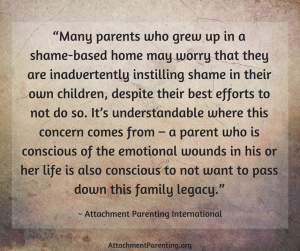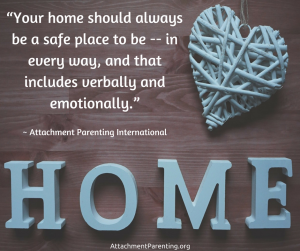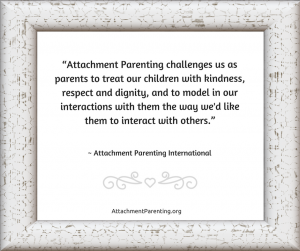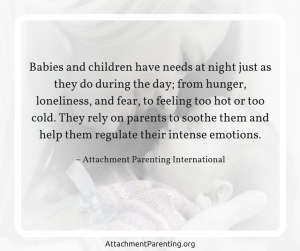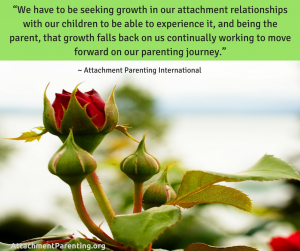Category: Use Nurturing Touch
What about boys and Attachment Parenting?
“As a culture, we have always had different perceptions and expectations of boys. People often fear that if boys are nurtured too much, it somehow warps their personalities and makes them too dependent and too sensitive. Conventional attitudes about boys permeate all aspects of society — parents, grandparents, teachers, and coaches — and has created…a ‘boy code’: myths that boys’ behavior is driven solely by their hormones and not the environment, boys need to learn to be tough at an early age, and so on. This code has only served to force boys to become disconnected from their feelings — less sensitive and more aggressive.
New research has begun to reverse this trend by emphasizing the importance of mothers and fathers in nurturing strong emotional connections with their sons.” ~ Attached at the Heart: Eight Proven Parenting Principles for Raising Connected and Compassionate Children
by Barbara Nicholson & Lysa Parker, API’s cofounders
Learn what this new research says, which directly makes the case for Attachment Parenting of our sons. Purchase your copy through the Amazon link above to have a portion of the proceeds benefit Attachment Parenting International (API).
Home should be safe in every way
Understanding Shame, part 4: Growing up shame-based
Editor’s note: This week, we offer you a 5-part series — originating in The Attached Family online magazine’s “Parenting Without Shame” issue — to help you better understand the development of toxic shame. Part 1 explained how trauma includes 3 components: Fear, Disconnection, and Shame. Part 2 explored Fear. Part 3 defined Disconnection. In this Part 4, we take a look at what it means to become shame-based.
Shame is a visceral and pervasive feeling of being fundamentally flawed and inadequate as a human being.
Shame is primarily relational: Although shame leaves us feeling absolutely alone, its roots lie in an implicit conviction that we are somehow unworthy of having meaningful relationships with other people.
Shame vs Guilt
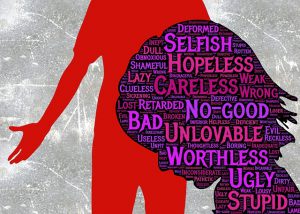 Shame is often confused with guilt, but with guilt, we feel bad about things we have done. With shame, we feel bad about who we are.
Shame is often confused with guilt, but with guilt, we feel bad about things we have done. With shame, we feel bad about who we are.
Guilt is about our actions. Shame is about our being.
Shame is mediated by the emotional networks of the brain, so although shame is typically accompanied by self-critical thoughts like “I am stupid/useless/fat/pathetic,” it is ultimately lived as an embodied experience that resides deep beneath our awareness and sucks us into the psychological equivalent of a black hole.
When Shame Becomes Toxic
Shame is a product of evolution, and it is experienced as a passing emotion in almost everybody. It exists to tell us that we are at risk of losing important social relationships, or that we might be thrown out of our group.
However, if we’ve been traumatized, then shame becomes indelibly interwoven with our implicit sense of who we are, whereupon our identity becomes “shame-based.”
There are several routes to becoming shame-based:
- Shame can originate outside of us — When we are made to feel inadequate by our family, caregivers, teachers, peers, culture, or socio-political environment, we absorb that shame and make it our own. In this case, being shamed constitutes the original painful and frightening experience around which our trauma-world is built.
- Human infants need sensitive and responsive nurturing from caregivers — When this need is not met, children develop an embodied and nonverbal sense of being inadequate. They also develop an embodied and nonverbal sense of inadequacy around their actual need for nurturing — implicitly feeling that there must be something wrong with them for having the needs.
- Shame can originate inside us as a response to more overt traumatizing experiences — Painful and frightening experiences occur that have nothing to do with being shamed. However, we have evolved a need to understand why these things have happened to us, and for various reasons, we tend to believe that we are at fault. For example, children whose parents divorce commonly feel that if they had been “better,” their parents would have stayed together.
- Once we’ve entered a trauma-world, shame can be created in response to our own behavior — There are times when we know we are over-reacting. However, because we aren’t aware that our fear system is hyper-sensitive, we take our behavior as evidence of our own supposed inadequacy. In addition, when we bury parts of ourselves in order to make ourselves acceptable to others, we implicitly sense that we are being inauthentic, which in turn creates shame.
Irrespective of how our shame originates, once we’ve become shame-based, we can’t recognize shame for what it is. Thus, we see ourselves through a distorted lens. As a result, we are likely to experience ourselves as contemptible and feel a victim to our own believed inadequacy.
What Doesn’t Work to Heal Shame
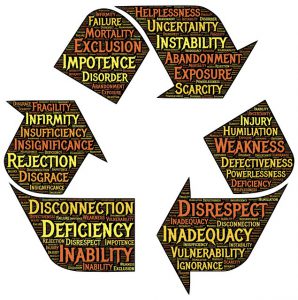 In this state, we get sucked into a downward spiral of shame. We can become even more desperate to obliterate the parts of ourselves that we believe make us inadequate, redoubling our efforts to shame those parts into submission. However, when we use shame against ourselves, we retraumatize ourselves. Then, instead of fostering change, we reinforce the status quo and fortify the walls of our trauma-world.
In this state, we get sucked into a downward spiral of shame. We can become even more desperate to obliterate the parts of ourselves that we believe make us inadequate, redoubling our efforts to shame those parts into submission. However, when we use shame against ourselves, we retraumatize ourselves. Then, instead of fostering change, we reinforce the status quo and fortify the walls of our trauma-world.
At the same time, we try to cajole ourselves into success, believing that if we can force ourselves to become more than we are — or ideally perfect — then the gnawing pain of being shame-based will abate. However, if we are shame-based, then no amount of success will be enough. No matter what we do, we are never enough.
Being shame-based doesn’t only poison our relationship with ourselves, it also poisons our relationships with others. When we are shame-based, we will be terrified that if others get to know us, they will see us as the inadequate person we believe ourselves to be. In an unconscious attempt to prevent that from happening, we may put up barriers, push people away, and sabotage relationships. Alternatively, we may try to control others, hoping that we can prevent them from doing anything that might bring our shame to the surface.
We are generally not conscious of what we are doing, or indeed why we are doing it. However, we are left with a murky feeling that our relationships lack authenticity, trust, and intimacy. As a result, we feel increasingly isolated.
Also, because human beings are such a profoundly social species, when we don’t have meaningful relationships, we feel sub-human, and that, in turn, exacerbates our shame.
In short, shame creates more shame. Shame also generates isolation and fear. And shame reinforces the need to disconnect. Ultimately, shame keeps us locked in our trauma-worlds.
Tomorrow, in Part 4, we’ll explore what does work in healing shame
Photo sources: Pixabay.com
Will you accept the challenge of Attachment Parenting?
Nighttime parenting
Bring kindness home
Kindness is a behavior marked by the quality of being generous, friendly, helpful, and considerate.
Editor’s Note: Today, February 17, is Random Acts of Kindness Day, an observance created by the Random Acts of Kindness (RAK) Foundation to spread kindness by encouraging individuals, groups, and organizations to engage in acts of kindness. In line with Attachment Parenting International, RAK foundation is striving to make strides towards building a kinder, more compassionate world.
As of late, I’ve been reflecting considerably on the notion of kindness. Perhaps it’s because, much like a mature tree, I’ve deepened my roots into the ground and spread my branches further out and up higher — I’ve grown more spiritual. Or, perhaps, it’s because I now bear fruits — I’ve become the mother of 2 children. Or, perhaps, it’s the fusion of both.
As I’ve become more rooted in recent years, I’ve evolved to become more kind to myself and others. In my role as a mother, I yearn for my kids to live in a kind world where gentleness and compassion is prevalent, not the exception. I also yearn for them to be kind to themselves, as well as others and the world — today, and always.
Often times, I’ve asked myself: What is the essence of kindness? What does it mean to be a kind person? Why are some people more kind than others? Why do some people find it challenging to act in kind ways? And, what can I do to promote more kindness on a personal level, in my family and the world?
The more I considered these questions, the more I realized that kindness has an essential element. Without it, kindness cannot stand. As I observe kind people all around me and as I watch acts of kindness carried out — small and big — I find a common thread: empathy.
Without empathy — the ability to feel another’s pain, the will to alleviate one’s suffering, or have sympathy — there is no space for kindness.
Parenting with Kindness
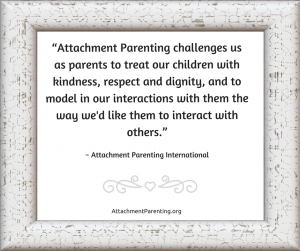 In the same way that empathy is a precursor for kindness to transpire, it is also a precursor for gentle, mindful parenting approaches such as Attachment Parenting.
In the same way that empathy is a precursor for kindness to transpire, it is also a precursor for gentle, mindful parenting approaches such as Attachment Parenting.
For a parent to respond to their child with sensitivity and attentiveness — even when, at times, it presents many challenges — there needs to be a recognition on the parent’s part that the child needs to feel safe and secure, be nurtured, listened to, and have close physical contact. This is what the child needs — not merely wants at a particular stage of development, and not as an attempt to manipulate.
For instance, a 6-month-old baby may be breastfeeding more frequently at night due to a growth spurt or his need for soothing due to teething discomfort. When the parent is able to view a situation from their child’s perspective, attending to their needs in a gentle, kind way comes naturally.
Kindness Can Change the World
Through positive discipline, children learn to resolve conflicts devoid of violence. Children learn that inflicting pain on others, or acting in unkind ways towards others, is not appropriate. When we empathize with our children and kindly respond to them, they learn to respond to others in the same way.
When we teach kindness by modeling kindness thorough our parenting practices, we spread kindness. Our children’s behavior affects others — in a positive or negative way.
Imagine a world where every child is raised in a home with the frame of kindness. Can you envision the beautiful, serene picture I do?
Inspired to read more about kindness?

